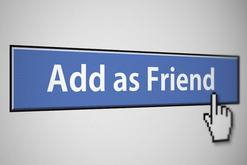 “Hi... I actually got another friend request from you which I ignored so you may want to check your account.” That’s a message millions received from Facebook friends over the past few days. If you followed the instructions and forward the message to your friends, you’re probably feeling a bit ashamed right now. “Stop! Ignore it! Delete it! Don’t forward it to all of your friends,” someone posted on Facebook, lamenting those duped by the hoax. If you did forward the message, you shouldn’t feel shame. You care about your friends, for which you should be commended, not chastised. We all have Facebook friends who aren’t necessarily “friends” in the traditional sense of the definition. We also know that our traditional definition for friend doesn’t apply to Facebook. We try so hard not to conflate the noun with the verb in conversations: “I don’t mean Joe is my friend in real life. He just friended me on Facebook.” Even Merriam-Webster knows the difference. Dictionary editors expanded the definition of friend with alternatives such as friended and friending, in part to capture the meaning of the transitive verb. I’m not sure Mark Zuckerberg knew what he was doing when he landed on that term – friend – as the signifier for adding people to our Facebook networks. By all accounts, Zuckerberg had few real friends at the time he created Facebook, so it’s likely he didn’t contemplate the implications for choosing that term. Or did he? When Facebook exploded in popularity, it was not only because of the number of new people who joined, but because of the number of new personal networks it cultivated for us. Zuckerberg was, in fact, growing Facebook by redefining the word “friend” in terms of networks, not individuals. Imagine snowballs rolling down a hill, smashing into each other to create larger snowballs – not an avalanche, but fast like one, with seemingly unending momentum. Those snowballs are our networks. They smash into one another. They mingle. They create connections we might otherwise never experience. This is true of people who aren’t really our friends, at least not in the true sense of the definition. We’ve simply added them as friends because, truth be told, it feels good to get a friend request. It’s a fleeting euphoric feeling, a dopamine hit. Maybe not for everyone, but for enough people that friend requests are approved with minimal scrutiny of those on the other end of the requests. It’s what made this latest Facebook hoax so problematic. We default to the traditional definition of friend. We care about our friends. We want to protect them from danger. If you were one of the millions who forwarded the hoax to everyone in your network, don’t feel bad. Feel good knowing that you care enough about your friends to protect them, even if they’re just Facebook friends.
0 Comments
Your comment will be posted after it is approved.
Leave a Reply. |
AuthorDr. Adam C. Earnheardt is special assistant to the provost and professor of communication in the department of communication at Youngstown State University in Youngstown, OH, USA where he also directs the graduate program in professional communication. He researches and writes on a variety of topics including communication technologies, relationships, and sports (with an emphasis on fandom). His work has appeared in Mahoning Matters as well as The Vindicator and Tribune-Chronicle newspapers. CategoriesArchives
July 2023
|
 RSS Feed
RSS Feed